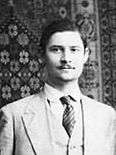Pavlo Khrystiuk
Pavlo Khrystiuk (Ukrainian: Павло Оникійович Христюк Pavlo Onykiyovych Khrystiuk, Russian: Па́вел Анике́евич Христю́к) (1880 – September 19, 1941) was a Ukrainian cooperator, historian, journalist, political activist, and statesman.
Pavlo Khrystiuk Павло Оникійович Христюк | |
|---|---|
 | |
| Chancellor | |
| In office June 15, 1917 – August 14, 1917 | |
| Prime Minister | Volodymyr Vynnychenko |
| Preceded by | position created |
| Succeeded by | Oleksandr Lototsky |
| Minister of Internal Affairs | |
| In office January 30, 1918 – February 1918 | |
| Prime Minister | Vsevolod Holubovych |
| Preceded by | Volodymyr Vynnychenko |
| Succeeded by | Mykhailo Tkachenko |
| State Secretary | |
| In office February 1918 – April 29, 1918 | |
| Prime Minister | Vsevolod Holubovych |
| Preceded by | Ivan Mirny |
| Succeeded by | Vyshnevsky (coup d'etat) |
| Personal details | |
| Born | 1880 Kuban Oblast, Russian Empire |
| Died | September 29, 1941 (aged 60–61) Sevvostlag, Soviet Union |
| Political party | UPSR (center) |
| Alma mater | Kiev Polytechnic Institute |
| Occupation | cooperator, historian, journalist, political activist, and statesman |
Biography
Khrystiuk was born in the Kuban Oblast. He studied in Kiev Polytechnic Institute as his party co-member, Vsevolod Holubovych. He worked for the newspaper Rada (Council). In 1916-17 he also worked for journal "Komashnia". Later in his career were the socialists-revolutionary newspapers "Borotba" and "Trudova Hromada".
He became a member of the Central Committee of the Ukrainian Socialist-Revolutionary Party (UPSR) and the Villagers Association. Also he was a member of the Central Rada and the Rada Minor as well as the Pysar (Scribe) in the General Secretariat of Ukraine. He is the co-author of the Land Reform of January 31, 1918.
He was a Minister of the Internal Affairs in the government of Vsevolod Holubovych (1918) and the deputy Minister in the government of Isaak Mazepa (1919). After the IV Party Congress he was among the members of the central current as M.Hrushevsky.
From 1919 Khrystiuk emigrated to Vienna, where he was a member of the UPSR "foreign delegation" and worked in the magazine "Boritesia-poboryte!". He returned to Ukraine in 1924 and worked for the Association of scientific and technological workers to influence the socialist construction (Kharkiv, 1928-1931). At that time he was also employed for the Chervony Shliach newspaper along with Pavlo Tychyna. He was the author of the history of revolution in Ukraine as well as numerous other books on the history of Ukraine.
Khrystiuk was arrested on March 2, 1931 as the member of the Ukrainian National Center and was convicted to imprisonment. He died in one of the camps of the Sevvostlag, Khabarovsk Krai.
Sources
- Encyclopedia of Ukrainian Studies (in 10 volumes), editor Volodymyr Kubiyovych. "Molode Zhyttia". Paris, New-York, 1954—1989;
- Minor dictionary of history of Ukraine, editor Valeriy Smoliy. — "Lybid". Kyiv, 1997;
- Padun-Lukyanova, Lesia. Extended name index;
- Surovtsova, Nadia. Recollections. "Olena Teliha Publishing". Kyiv, 1996.
External links
- Works by or about Pavlo Khrystiuk at Internet Archive
- Chysnikov, V. Energetic and creative person. "Imenem zakonu".